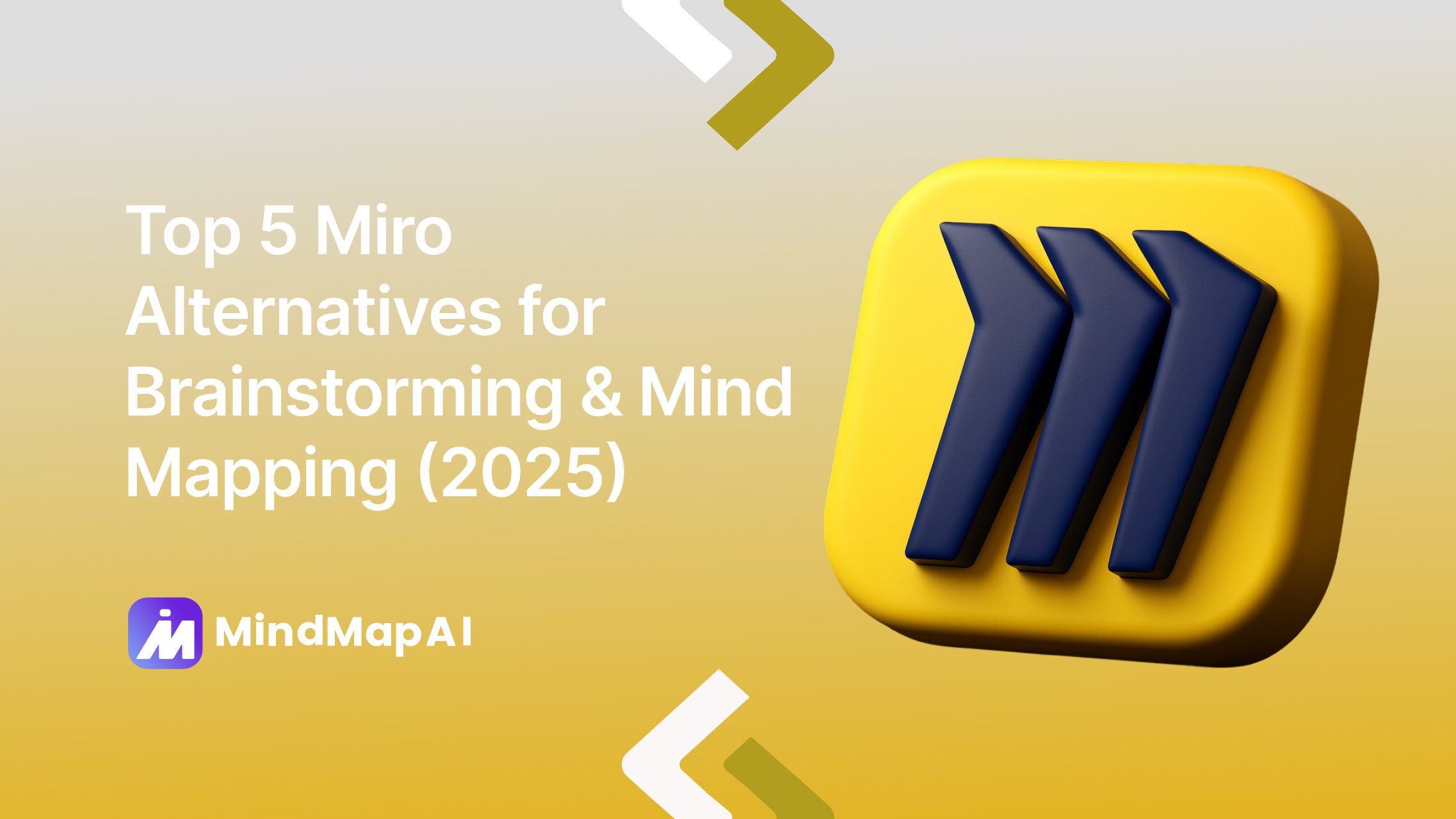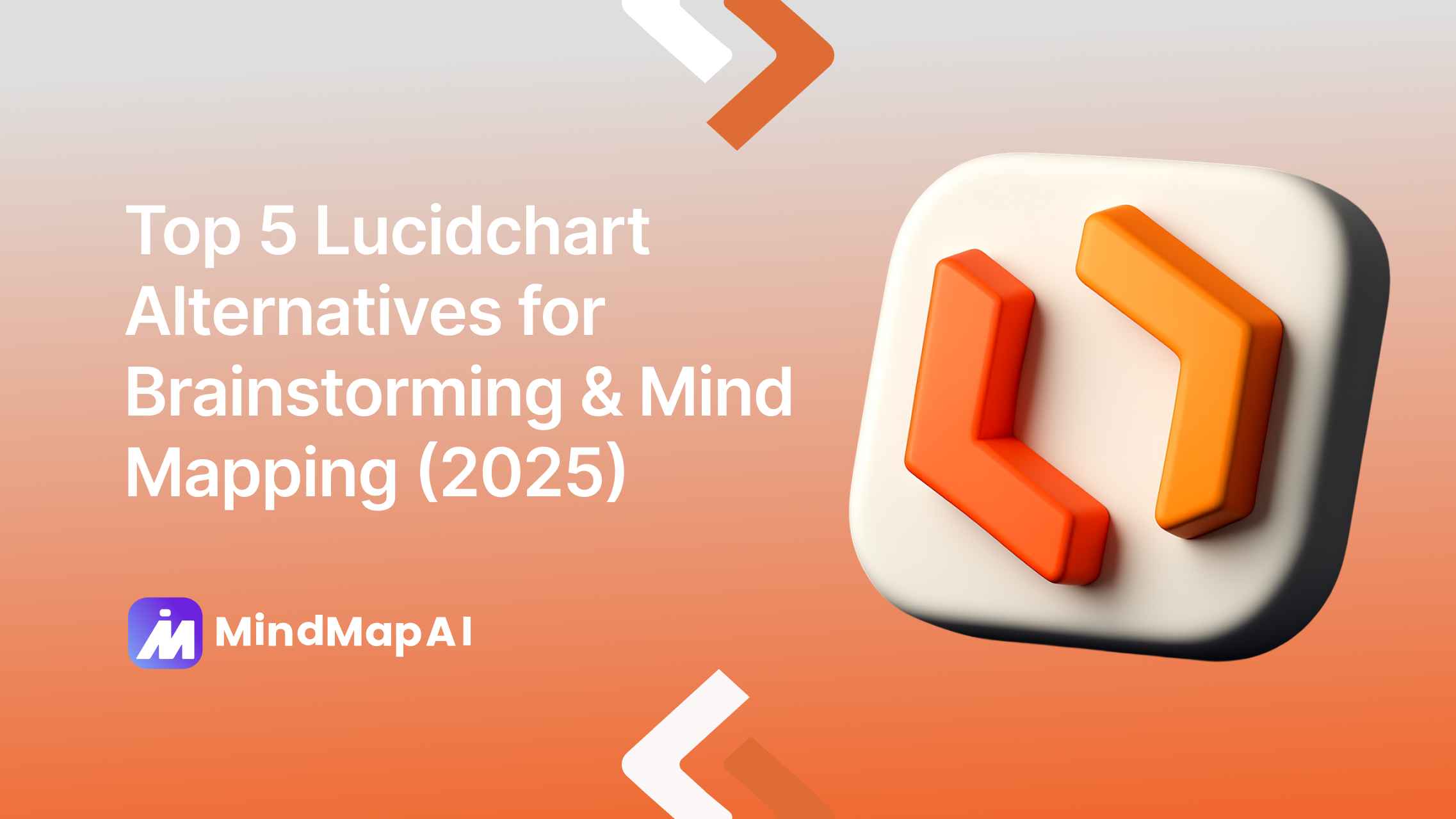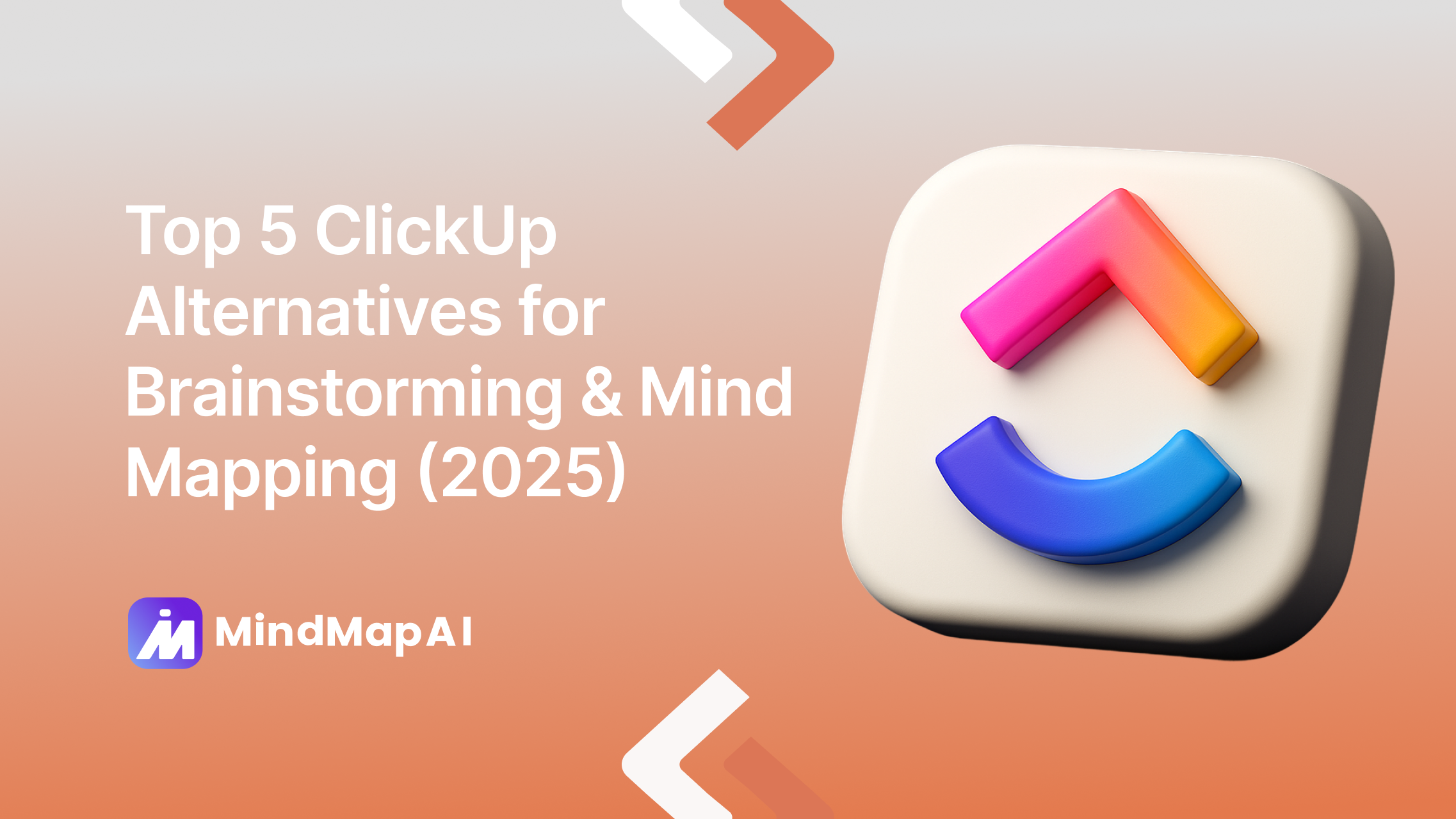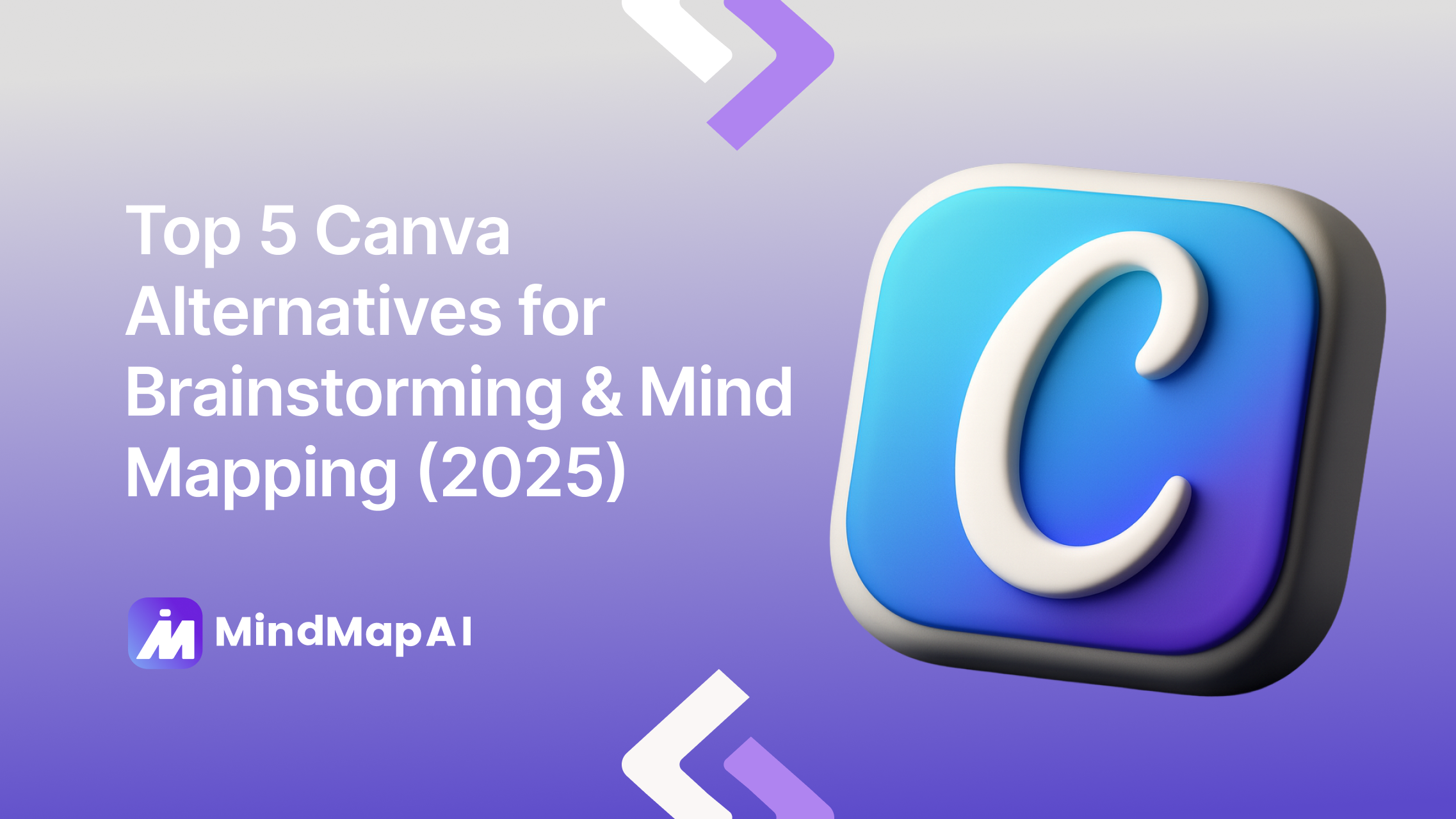
Top 5 Miro Alternatives for Brainstorming & Mind Mapping (2025)
Miro is one of the most popular online collaboration tools used by teams around the world to brainstorm, plan, and bring ideas to life visually. With its endless whiteboard, AI-powered workspace, and more than 250 integrations, it’s a favorite for cross-functional teams that value speed, creativity, and visual clarity. Whether it’s mapping user journeys, running design sprints, or planning product roadmaps, Miro’s flexibility makes it a top choice for modern teams.
However, while Miro shines in visual collaboration, it can feel a bit overwhelming if your main goal is simple mind mapping and idea organization. Its enterprise-level workflows and AI features may be more than what individuals or small teams really need. If you’re looking for something more focused tools that make visualization, idea mapping, and structured thinking easier, there are better options available.
This guide highlights the best Miro alternatives for 2025, AI-powered brainstorming and mind-mapping tools that help you think creatively, organize ideas faster, and turn inspiration into action.
Transform your thoughts into stunning AI-powered mind maps in seconds
Why look for Miro alternatives?
Miro is excellent for team collaboration and interactive whiteboarding, but its mind mapping features are mostly manual and rely on templates. If you want tools that can automatically create maps from your content, expand or summarize ideas with AI, or handle complex diagrams, the options below offer stronger capabilities, especially MindMap AI for AI-powered mapping and Lucidchart for professional diagramming.
1. MindMap AI

Why it stands out
MindMap AI takes idea mapping far beyond basic whiteboards and manual layouts. You can upload text, PDFs, images, audio, CSVs, or videos and instantly get a clear, editable mind map. Its AI-powered Copilot Chat helps you expand ideas, summarize branches, and dive deeper into topics in real time. Plus, the Second-Order Connections feature reveals hidden links between ideas perfect for research, academic projects, planning, and complex brainstorming.
Unlike Miro, which focuses mainly on live collaboration and template-based mapping, MindMap AI offers true AI interactivity, supports multiple content types, and provides rich export options. It’s built for individuals and small teams who want to think faster, stay organized, and keep full creative control.
Key Features
Multi-format input: Text, PDFs, images, CSV, audio, video, and more.

AI Copilot Chat & Context Menu: Summarize, expand, and focus topics in real time.

Second-Order Connections: Detect related ideas and surface hidden links.

Flexible exports & sharing: PNG, SVG, PDF, Markdown, CSV, project files; private/public links.

Apps & extensions: iOS, Android, Chrome & Edge
Version history & cloud storage
Pros
The AI automatically expands ideas, summarizes content, and refines topics.
It works seamlessly with real materials like notes, PDFs, recordings, and lectures.
There’s a generous free plan with extra discounts for students.
Pricing is flexible and affordable with monthly, yearly, and lifetime plans available.
It offers rich export options that go far beyond most whiteboard tools.
Cons
Real-time co-editing isn’t available yet, you can only share your work through links.
It offers fewer visual templates compared to full-featured whiteboarding platforms.
Pricing
Free: 50 AI credits/month
Basic: $3.74/mo billed yearly (2,000 credits)
Pro: $7.49/mo billed yearly (5,000 credits)
Add-on credits from $4.99; lifetime plans available
Still using Miro for brainstorming? See how MindMap AI outperforms it in AI mapping.
2. ClickUp

Why it stands out
ClickUp is a complete productivity platform that combines tasks, documents, dashboards, whiteboards, and mind maps all in one place. It helps teams turn brainstorming sessions into actionable plans without switching between different tools. By keeping everything centralized, projects stay organized and aligned. Its visual boards and flexible structure make it easy to map ideas, plan workflows, and track progress through clear dashboards.
With ClickUp Brain, AI takes collaboration a step further by summarizing notes, answering questions across connected apps, and even generating content. This helps teams brainstorm faster, stay focused, and turn ideas into structured plans effortlessly, making ClickUp one of the strongest all-in-one tools for modern work management.
Key Features
Includes tools for tasks, documents, goals, dashboards, sprints, and automations.
Offers whiteboards and mind maps built right into your projects.
ClickUp Brain adds AI features like note-taking, writing, and smart Q&A across apps.
Supports 15+ project views including list, board, Gantt, and timeline.
Comes with ready-made templates for common workflows.
Pros
A single workspace that connects ideas, tasks, and timelines.
Powerful automation and reporting features to streamline work.
Ideal for marketing, product, and operations teams.
Cons
Mind mapping is included, though it’s not as advanced as dedicated AI-powered tools.
The setup offers a lot of flexibility, which can feel a bit overwhelming at first.
Pricing
Free Forever; paid tiers unlock advanced features & AI usage
3. Lucidchart

Why it stands out
Lucidchart is a versatile diagramming platform designed for teams and professionals who need precision and clarity in visual communication. It supports process maps, system and architecture diagrams, organizational charts, and concept mapping, making it ideal for technical, operational, or process-driven work. Its structured canvas ensures that complex information is organized logically, improving understanding and decision-making.
With Lucid AI, diagram creation becomes faster and smarter, as the AI can generate visual representations from text, summarize workflows, and offer recommendations for optimizing diagrams. This combination of technical rigor and AI assistance makes Lucidchart a standout alternative for structured brainstorming and workflow visualization.
Key Features
Lucid AI helps you automatically create and summarize diagrams.
Supports data linking, conditional formatting, layers, and even diagram-as-code.
Includes extensive libraries for UML, ERD, and cloud architecture diagrams.
Integrates deeply with tools like Atlassian, Microsoft, Google, Notion, and Slack.
Part of the Lucid Suite, which also includes Lucidspark for whiteboarding.
Pros
Technical and process visualization
Enterprise teams needing governance and training support
Data-driven automation with extensive diagram libraries
Cons
Too advanced for simple brainstorming tasks
Mind mapping is available but not the main focus
Pricing
Free plan available
Paid tiers for Individual, Team, and Enterprise users
4. Mural

Why it stands out
Mural is a visually focused collaboration tool designed to help teams brainstorm, plan, and execute ideas with clarity. Its endless canvas lets you create mind maps, flowcharts, and sticky-note boards that bring structure to workshops, strategy sessions, and customer-focused planning. With Mural AI, teams can quickly summarize discussions, generate new ideas, and organize concepts right within the workspace making creative sessions faster and less manual.
The platform’s strong Microsoft 365 Copilot integration makes it a great fit for organizations that rely on Teams. It supports real-time collaboration, smooth file sharing, and improved productivity. Mural is especially useful for consultants, project managers, and facilitators who want to run interactive, high-impact workshops efficiently.
Key Features
Interactive tools for facilitation, including templates, voting, and timers
Mural AI helps summarize and organize content automatically
Strong Microsoft partnership with integrations for Teams and Surface Hub
Enterprise-grade security, services, and training options
Pros
Great for running structured workshops and large-scale enterprise sessions
Deep integration with Microsoft’s ecosystem
Proven success stories showing strong ROI and time savings
Cons
Mind mapping is based on templates and lacks full AI-driven generation.
The platform focuses more on facilitation and workshops than on automated research mapping.
Pricing
Offers a free plan, with additional Business and Enterprise pricing tiers.
5. NotebookLM

Why it stands out
NotebookLM is an AI-powered research assistant that helps you work with information faster and more intelligently. You can upload PDFs, web links, YouTube videos, audio files, or Google Docs and Slides, and it instantly summarizes key points, highlights quotes, and uncovers connections between sources. It’s like having a personal research partner that helps students, researchers, and professionals organize and make sense of complex material with ease.
When paired with a visual tool like MindMap AI, you can turn NotebookLM’s AI-generated notes into clear, interactive mind maps. This makes it easier to visualize, analyze, and present your ideas transforming research and planning into a highly efficient, visually engaging process.
Key Features
Supports multiple input types including PDFs, websites, videos, audio files, and Google Docs/Slides.
Provides source-based answers with clear inline citations.
Offers an “Audio Overview” feature for quick, on-the-go learning.
Strong privacy focus your personal data is not used to train NotebookLM.
Pros
Excellent for combining research from different sources into structured notes.
Builds trust with clear citations and source-based answers.
Inspires fresh ideas by working across multiple types of media inputs.
Cons
Not designed as a visual whiteboard or diagramming tool.
Requires a separate mind mapping tool to turn notes into visual maps.
Pricing
Free and paid plans may differ depending on your region, be sure to check the latest availability and pricing.
Not sure which tool fits your style?
Comparison at a Glance
| Tool | Mind-map focus? | AI features | Best for | Free plan? | Platforms |
|---|---|---|---|---|---|
| MindMap AI | Yes (AI-first) | Copilot Chat, file-to-map, summarize, focus, second-order links | Students, researchers, creators | Yes | Web, iOS, Android, Chrome/Edge |
| ClickUp | Whiteboards + mind maps | ClickUp Brain (connected AI) | Teams needing tasks + docs + boards | Yes | Web, desktop, mobile |
| Lucidchart | Diagramming + concept maps | Lucid AI (generate/summarize) | Technical diagrams & process maps | Yes | Web, desktop apps, mobile |
| Mural | Whiteboarding (maps via templates) | Mural AI + Microsoft 365 Copilot | Facilitation, consulting, MS 365 orgs | Yes | Web, desktop, mobile |
| NotebookLM | Research → outlines (export to mapper) | Summaries, citations, insights, Audio Overview | Research synthesis & planning | Varies | Web, apps (availability varies) |
FAQs
Q: Why do people look for Miro alternatives for brainstorming?
A: Miro is excellent for enterprise-level collaboration but can feel overwhelming for individuals or small teams who just need fast, focused mind mapping. Alternatives like MindMap AI simplify brainstorming by turning text, PDFs, or recordings into structured maps instantly, without managing hundreds of templates or permissions.
Q: Which Miro alternative offers the most advanced AI for mind mapping?
A: MindMap AI. It supports multi-format ingest (PDFs, videos, audio, CSVs, images, text) and offers Copilot Chat to expand, summarize, and Second-Order Connections to link ideas automatically, something Miro’s AI whiteboard doesn’t yet do.
Q: Can I use AI to turn my notes or PDFs into a mind map automatically?
A: Yes. MindMap AI lets you drop in notes, PDFs, or recordings and instantly builds an editable mind map. You can then use AI chat to expand or summarize branches, making it faster and smarter than manually mapping in Miro.
Final Takeaway
Miro is still one of the strongest platforms for visual collaboration and enterprise teamwork. However, the best Miro alternatives of 2025 now offer a more focused, AI-powered experience perfect for users who value creativity, structure, and clarity.
MindMap AI stands out as one of the smartest Miro alternatives. It automatically turns your text, PDFs, videos, audio files, or research notes into editable mind maps through its free AI mind mapping tools. This helps you brainstorm, organize, and plan ideas with accuracy and ease. With powerful features like AI Expand, Summarize, and Focus Topic, MindMap AI seamlessly bridges the gap between brainstorming and real execution. It also supports real-time collaboration, multiple export formats (PDF, PNG, SVG, Markdown), and smart layouts that bring instant structure to even the most complex ideas.
If Miro feels too broad for your needs, MindMap AI offers a more focused, intuitive, and AI-driven way to brainstorm and visualize ideas making it the best Miro alternative for mind mapping in 2025.








